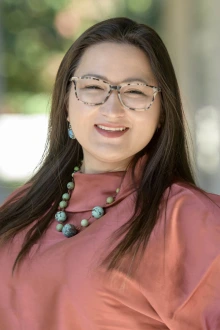Dr. Amanda Wilson Honored with Health Sciences Career Development Award
The University of Arizona Health Sciences Career Development Awards (CDA) program recently selected Amanda Wilson, PhD, MS, who joined the Mel and Enid Zuckerman College of Public Health this month as assistant professor of community, environment and policy, as one of its four 2021 recipients.

Amanda Wilson, PhD, MS
“I am thrilled that this award offers the opportunity to gain skills in a new area and to translate these skills to my future work,” said Dr. Wilson. “I am fascinated by the risk-risk tradeoffs that are at the heart of so many of our health-related decisions. My goal is to understand how we perceive and balance these risks to ultimately guide and promote healthy behaviors and improve our environmental health monitoring strategies to ensure we’re striking these balances.”
Dr. Wilson is interested in the impact of everyday human interactions in built environments on health, especially in terms of microbial exposure and risk assessment. She hopes to harness the methods of science, mathematical modeling, sociology and psychology to learn more about the chemical-exposure risks associated with cleaning and disinfection practices, weighing them against the risks posed by viruses and other pathogens. Recently, she co-developed a risk-scoring algorithm for a COVID-19 contact tracing app, Covid Watch.
As the COVID-19 pandemic underscored the importance of infection control in hospitals and clinics, health care workers have stepped up cleaning and disinfection efforts. Exposure to chemicals associated with these practices may lead to the exacerbation of asthma. Using methods from a variety of disciplines, Dr. Wilson will investigate whether increased asthma risks are outweighed by decreases in occupational infection risks. She will conduct focus groups, surveys and interviews to gauge health care workers’ risk perceptions around occupational asthma and microbial exposures, and compare asthma prevalence among health care workers to health care workers’ tolerated asthma exacerbation risk levels.
CDA scholars must complete an independent research project, which is expected to generate sufficient pilot findings to enable the submission of an NIH K-series or R01 grant (or equivalent) by the second year of the program. Each scholar also must choose a lead mentor, or mentors if the project is multidisciplinary.
“Dr. Wilson is prepared to synthesize and apply training from multiple disciplines, including civil and systems engineering, public health, infectious disease medicine and mathematical biology,” said Dr. Wilson’s primary mentor, Paloma Beamer, PhD, associate professor of community, environment and policy at the College of Public Health. “Dr. Wilson’s strengths include her ability to work on highly multidisciplinary teams to address complex health science problems and the high productivity she can achieve despite the challenges that come with this type of research. She will continue to build upon this strength.”
The CDA program was established by the Office of the Senior Vice President for Health Sciences in 2014 to provide research training and funding for junior faculty members and foster academic careers in clinical and translational research. Selected scholars are provided with mentorship, research training and salary support, plus funding for travel and research supplies.
Meet the other junior faculty members who were selected for this latest round of awards:
- Chris Lim, PhD, assistant professor of community, environment and policy, Mel and Enid Zuckerman College of Public Health;
- Andreia Chignalia, PharmD, PhD, research assistant professor of anesthesiology, College of Medicine – Tucson;
- David Tzou, MD, assistant professor of urology, College of Medicine – Tucson

